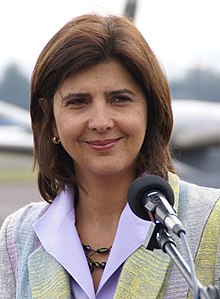María Ángela Holguín Cuéllar
| María Ángela Holguín | |
|---|---|
 |
|
| Minister of Foreign Affairs | |
|
Assumed office 7 August 2010 |
|
| President | Juan Manuel Santos |
| Preceded by | Jaime Bermúdez |
| 25th Ambassador to the United Nations | |
|
In office 16 September 2004 – 11 September 2006 |
|
| President | Álvaro Uribe |
| Preceded by | Alfonso Valdivieso Sarmiento |
| Succeeded by | Claudia Blum |
| Ambassador to Venezuela | |
|
In office 16 September 2002 – 20 August 2004 |
|
| President | Álvaro Uribe |
| Preceded by | Germán Bula Escobar |
| Succeeded by | Enrique Vargas Ramírez |
| Personal details | |
| Born |
13 November 1963 Bogotá, Colombia |
| Political party | Liberal Party |
| Spouse(s) | Santiago Jiménez Mejía (1983–1990) |
| Domestic partner | Carlos Espinosa Pérez |
| Children | Antonio Espinosa |
| Alma mater |
University of the Andes Center for Diplomatic and Strategic Studies |
| Religion | Roman Catholicism |
| Signature | |
María Ángela Holguín Cuéllar (born 13 November 1963) is the Minister of Foreign Affairs of Colombia. She has also served as the 25th Permanent Representative of Colombia to the United Nations, and as Ambassador of Colombia to Venezuela.
María Ángela Holguín Cuéllar was born on 13 November 1963 to Julio Holguín Umaña and Lucila Cuéllar Calderón. She is related to Carlos and Jorge Holguín Mallarino, briefly appointed as interim presidents of Colombia in the presidential periods of 1888–1892 and 1921–1922 respectively.
Holguín studied at the Gimnasio Femenino school in Bogota, and then studied French at the Université Paris X. She graduated from the University of the Andes in 1988 with a bachelor's degree in Political Science, and she also completed a specialization there in Public Management and Administrative Institutions in 1992.
In 2010, while Holguín was serving as Colombia's Representative to the Development Bank of Latin America in Buenos Aires, the then president-elect Juan Manuel Santos Calderón nominated her to head the Ministry of Foreign Affairs. Holguín's nomination was hailed as a wise political move given the diplomatic problems in the region following the 2008 Andean diplomatic crisis. Holguín's ambassadorship in Venezuela was overall seen as the tacit endorsement that enabled her to tackle the diplomatic détente between the sister nations, while her work with the Development Bank of Latin America signalled Santos' desire to strengthen ties with the rest of the continent.
...
Wikipedia
